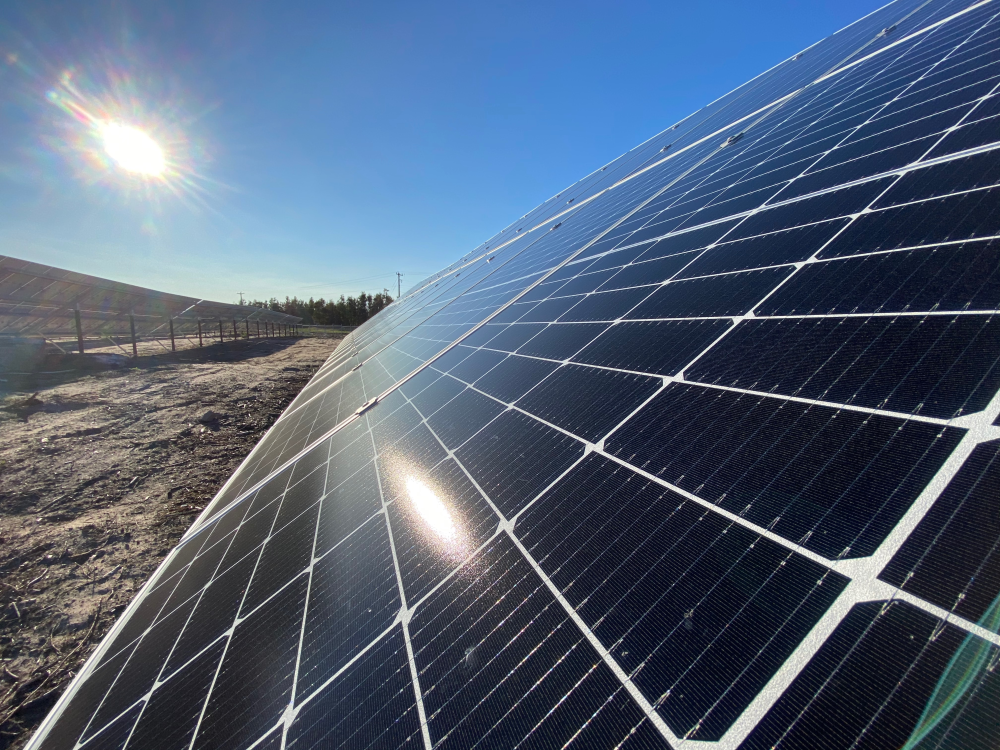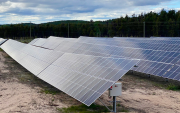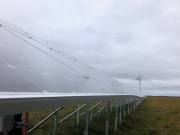This is the eleventh publication in Climate and energy policy advancements: Eliminating diesel in Canada’s remote communities, a series providing insights, details and analysis of each of the specific policies we advocate for under our Renewables in Remote Communities (RiRC) program and the Indigenous Off-diesel Initiative (IODI).
Accelerating the clean energy transition in remote communities requires a deep interrogation of existing rights-based legislation and policies. This is especially the case because most remote communities are home to Indigenous Peoples who rely on diesel to heat and generate electricity for their homes and to travel in and out of their communities (an issue we call ‘diesel dependency’). But while diesel provides communities with critical services, it also comes at a high social, health, environmental, and economic cost.
Moving away from diesel dependency is a difficult challenge, but it is also an increasingly possible one — a reality further emphasized by the recent increased uptake of clean energy projects in remote communities across Canada. While this progress is encouraging, further advancement is hindered by persistent systemic barriers that limit the ability of communities to own and manage their own energy systems. Among those challenges are significant issues relating to how — or whether — federal and provincial governments centre Indigenous rights, knowledge and priorities within processes and policies of energy system change. Until these issues are fully addressed through legislation and proper funding, a successful clean energy transition in remote communities cannot be fully realized.
Recognizing and affirming Indigenous rights through legislation
Since 2021, federal and provincial governments have brought forward a range of legislative items which affirm the rights of Indigenous Peoples. These acts, developed in response to the landmark United Nations Declaration on the Rights of Indigenous Peoples (UNDRIP), provide the foundation for how colonial governments can act on critical human rights issues related to “the fundamental importance of the right to self-determination of all peoples.”
At the federal level, legislative action on UNDRIP came with the passing of the United Nations Declaration of the Rights of Indigenous Peoples Act, which requires the federal government to ensure that Canadian law is both consistent with UNDRIP and followed through with an action plan that can achieve the objectives of the declaration. In acting on this legislative commitment, the federal government has allocated $31.5 million total to engage communities to prepare the action plan. Working in collaboration with First Nations, Metis, and Inuit Peoples, as well as various representative organizations, the Government of Canada developed the Draft Action Plan; the finalized plan is expected to be announced in the spring of 2023.
In addition to these steps, the federal government has also committed nearly $77 million to Justice Canada and Natural Resources Canada to develop measures that ensure the consistency of federal laws with UNDRIP, and to develop an action plan to achieve this objective in collaboration with Indigenous partners.
At the provincial level, the Government of British Columbia remains the only province which has officially aligned their legislative agenda with UNDRIP through its Declaration on the Rights of Indigenous Peoples Act in 2019. Under the Declaration Act, the B.C. government has committed to co-developing recommendations on strategic policies and initiatives for clean energy with Indigenous communities.
Self-determination in reducing diesel consumption
UNDRIP is a comprehensive international human rights instrument that protects the rights of Indigenous Peoples around the world. Among other important actions, UNDRIP affirms the right Indigenous Peoples have to “self-determination,” a concept that relates to the right of individuals and communities to make their own political and economic choices for the betterment of their communities. In the energy context, this often translates to calls for “Indigenous energy sovereignty,” or the right to develop, own, and independently control local energy systems, including choosing their energy sources.
In the case of remote communities in Canada, the current dominant energy source is diesel, a dirty fuel carrying high social and environmental costs for already under-resourced communities. Federal, provincial, and territorial governments currently support efforts to reduce diesel consumption in remote communities, but persistent systemic barriers halt or delay progress. Overcoming these barriers in alignment with the principles of UNDRIP calls for a fundamental shift across Canada’s current status quo energy landscape. In particular, this shift must reflect a commitment to including and prioritizing Indigenous perspectives and leadership in decision-making around clean energy project development in addition to regulatory reform to support the energy transition.
Because governments and communities are generally aligned in their objectives of reducing diesel and working toward reconciliation, pathways for change and the acceleration of the clean energy transition are clear. These pathways depend on strong and authentic engagement and collaboration processes that respect and honor Indigenous rights to self-determination. Furthermore, respecting and upholding these rights allows governments to meet their legislative obligations, support Indigenous energy sovereignty, and correct colonial status quo policies.
Engagement, collaboration, and capacity building
Engagement and collaboration with First Nations and Indigenous communities is a process involving years of relationship building and capacity funding, which require proper resourcing and trust-building among many different actors. Currently, there exist several examples of these efforts at both the provincial and federal level, each demonstrating opportunities and learning lessons for more productive engagement and collaboration as the clean energy transition continues:
Indigenous Clean Energy Opportunities process in B.C.
The Indigenous Clean Energy Opportunities (ICEO) process is an ongoing convening space for First Nations leaders and government officials in British Columbia. Since 2022, the ICEO process has hosted engagement sessions to discuss a range of issues and opportunities related to the clean energy transition in remote communities across B.C. Discussion topics range from First Nation’s interest in future electricity, hydrogen, and other clean markets to barriers faced by Indigenous-led renewable energy project proponents (and the legislative and regulatory reform required to remove them).
The ICEO process was created to ensure that future changes to energy sector legislation and regulation are designed and carried out in collaboration with Indigenous communities. The ICEO process is a strong first step towards collaboration and alignment with UNDRIP, but the B.C. government has not yet publicly implemented any accountability measures to ensure that the voices from the ICEO process are heard, that their conclusions are respected, and that their recommendations are implemented.
Hosting regular engagement sessions are just one of the many methods governments can use to respect and enable the greater realization of Indigenous rights to self-determination and energy sovereignty. These methods are most effective, however, when they are well resourced and supported by strong mechanisms of transparency, accountability, and capacity-building for First Nations to participate.
Indigenous Off-Diesel Initiative
Natural Resource Canada’s Indigenous Off-diesel Initiative (IODI) is a positive example of effective and flexible government programming that is applying new and innovative approaches to funding allocation and strengthening Indigenous capacity. The first cohort of the program, composed of 14 energy champions in remote Indigenous communities, has been provided mentorship, training, and funding to build and deepen capacity in their communities, develop robust community energy plans and build projects to decrease their communities’ diesel consumption. The IODI program structure ensures that the champions are equipped with the skills and expertise needed for community energy planning and project implementation. In addition, the flexible funding model allows champions to choose where to dedicate funds depending on their needs.
These program features demonstrate how governments can better support Indigenous leadership in the clean energy transition through comprehensive program design and creativity. Pembina has been a partner of the IODI for the last four years and applauds Natural Resources Canada and the Indigenous Clean Energy Social Enterprise in delivering the program’s second cohort which will start this spring.
Wah-ila-toos
Wah-ila-toos, formerly called the Clean Energy in Indigenous, Rural and Remote Community Hub, is a federal government program designed to fund clean energy projects for rural and remote Indigenous communities seeking to reduce diesel use. The program — designed and delivered in collaboration with Indigenous partners, rights holders, and organizations; Natural Resource Canada; Crown-Indigenous Relations and Northern Affairs Canada; Indigenous Services Canada; and Environment and Climate Change Canada — consolidates all existing funding streams into a single process.
The interdepartmental initiative was gifted the name Wah-ila-toos following a sacred naming ceremony held by grandmothers and elders. The new name “Wah-ila-toos” represents our collective responsibility to uphold our good relations with each other and is formed from three words in the Nehiyaw and Michif, Inuinnaqtun and Haíɫzaqvḷa languages. The name emphasizes that we are all related, that we are all in relationship with everything and everyone; that we are all kin.
The name change, along with the formation of an Indigenous council and governing board, foregrounds the centrality of collaboration for the program and demonstrates the federal government’s commitment to reconciliation through the centering of Indigenous voices and values in clean energy.
Conclusions
While there is still much to do to untangle the colonial history of the energy sector, the steps the government has taken thus far — affirming Indigenous rights through adoption of legislation, funding communities, and building forums for collaboration with Indigenous leaders as equals — represent positive movement towards reconciliation, diesel reduction, and energy sovereignty. Despite these productive developments, however, Indigenous communities continue to face persistent economic, regulatory, and political barriers as they seek to reduce diesel dependency and realize energy sovereignty.
Confronting these barriers through a commitment to the inclusion of Indigenous leadership within decision-making and design processes can support the advancement of multiple government priorities. Key among them include the implementation of UNDRIP into Canadian law and the translation of UNDRIP principles into diesel reduction policies in remote communities. These priorities can only be met through a commitment to sustained resourcing, trust-building, and engagement and collaboration with Indigenous communities in addition to a government commitment to transparency and accountability.

Climate and energy policy advancements: Eliminating diesel in Canada’s remote communities
Publications in this series:
- Rethinking energy policy in Canada’s remote communities
- How to boost renewable energy integration in remote communities
- What’s a fair and equitable price for renewable energy in remote communities?
- Better government policies will unlock the cash remote Indigenous communities need for clean energy
- Reducing emissions from diesel generators in remote communities
- When business-as-usual is a barrier to clean energy
- From diesel dependency to energy empowerment
- Three clean energy options that could help replace diesel
- Remote communities transitioning to clean energy need better housing
- How remote communities should be included in the push to electrify transportation
- Government action on UNDRIP and the clean energy transition













